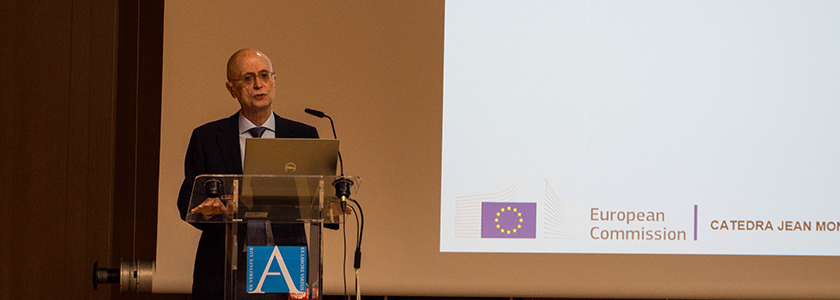On May 12th and 13th, the Iberoamerican University Foundation (FUNIBER) organized a Spanish seminar entitled “European Union Telecommunications Policy to those of the European Digital Ecosystem” as part of the third course closing of the Jean Monnet Chair “EU Telecommunications Policy and the Information Society,” held by the Universidad Europea del Atlántico (European University of the Atlantic, UNEATLANTICO).
For the past three years, the Jean Monnet Chair “EU Telecommunications Policy and the Information Society” has promoted teaching, dialogue, and reflection on the strategic role of telecommunications in the European Union. Dr. Miguel López-Coronado, director of UNEATLANTICO’s Jean Monnet Chair, announced during the conference the forthcoming publication of a book on the Chair with the participation of several professionals in the area.
This latest edition of the seminar focused particularly on the geopolitical and regulatory dimensions of telecommunications, with an emphasis on network security, microchip governance, and the impact of artificial intelligence on citizens’ rights. These topics were selected due to their growing importance in an unstable global context, marked by war, digital threats, and rapid technological transformation.
The overall objective of the project has been to foster a deeper understanding of EU digital policy among students, professionals, and the general public. Through academic conferences, public debates, and international collaboration, the Chair has contributed to raising awareness of the European Union’s strategic autonomy in digital infrastructures and their implications for democracy, innovation, and sovereignty. This year’s seminar gathered experts from academia, public administration, and the private sector, with participation from Latin America and Europe, both in person and through online platforms. The seminar consisted of two days of intensive sessions, with three expert presentations each day, ensuring a deep understanding of each topic.
In addition, student participation was essential. His presence helped reinforce the educational mission of the Chair and its long-term impact on next-generation digital policy leaders.
Dr. Silvia Aparicio, UNEATLANTICO’s Vice Rector for Academic Planning and Faculty, inaugurated the seminar.
The first presentation was given by Dr. Miguel López-Coronado, Director of UNEATLANTICO’s Jean Monnet Chair. His lecture, entitled “EU Trends in Telecommunications”, addressed the main strategic directions and developments in the telecommunications sector in the EU.
Then, Dr. Jorge Pérez Martínez, from the Technical University of Madrid, gave an online lecture entitled “Evolution and Trends in the Global Digital Ecosystem”, in which he analyzed the main global developments in the digital environment and their international impact.
The day was closed by Emilio García García, digital policy analyst and author of the book “Chips and Power”, who presented the online session “The Geopolitical Battle of Microchips”. His lecture focused on the strategic importance of semiconductors in global economy and security.
Tuesday’s session began with a presentation by Javier Puente, General Director of Innovation, Technological Development, and Industrial Entrepreneurship of the Government of Cantabria. His presentation, “Telecommunications in Cantabria”, analyzed the current state of the regional telecommunications infrastructure and its development prospects.
Next, Dr. Xavier Larriva, from the Technical University of Madrid, gave a presentation on “Network Security”, where he analyzed the main challenges and strategies to strengthen cybersecurity in digital environments.
Afterwards, Moisés Barrio Andrés, legal advisor to the Council of State and professor of Digital Law, gave an online lecture entitled “Futures Studies on the Impact of Artificial Intelligence on Citizens’ Rights”, in which he addressed the legal and ethical challenges arising from the use of AI in modern society. The event concluded with closing remarks by Dr. Miguel López-Coronado.
The event was held in collaboration with the Universidad Internacional Iberoamericana de Puerto Rico (International Iberoamerican University, UNIB), the Universidad Internacional Iberoamericana de México (International Iberoamerican University of Mexico, UNINI Mexico), the Fundación Universitaria Internacional de Colombia (International University Foundation of Colombia, UNINCOL), the Universidade Internacional do Cuanza (International University of Cuanza, UNIC), and the Universidad de La Romana (University of La Romana, UNIROMANA).
The sessions are available in the following links:

“Funded by the European Union. However, the opinions expressed are the sole responsibility of the author(s) and do not necessarily reflect the views of the European Union or the European Education and Culture Executive Agency (EACEA). Neither the European Union nor the granting authority can be held responsible for them.”
